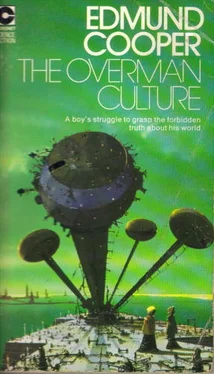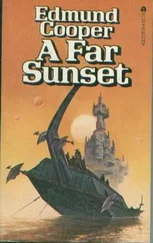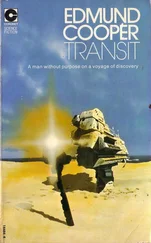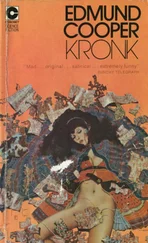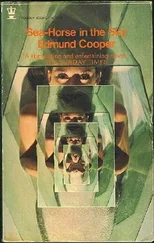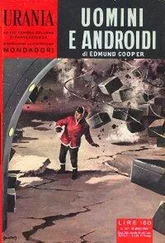Edmund Cooper - The Overman Culture
Здесь есть возможность читать онлайн «Edmund Cooper - The Overman Culture» весь текст электронной книги совершенно бесплатно (целиком полную версию без сокращений). В некоторых случаях можно слушать аудио, скачать через торрент в формате fb2 и присутствует краткое содержание. Город: London, Год выпуска: 1977, ISBN: 1977, Издательство: Coronet Books, Жанр: Фантастика и фэнтези, на английском языке. Описание произведения, (предисловие) а так же отзывы посетителей доступны на портале библиотеки ЛибКат.
- Название:The Overman Culture
- Автор:
- Издательство:Coronet Books
- Жанр:
- Год:1977
- Город:London
- ISBN:978-034017860
- Рейтинг книги:5 / 5. Голосов: 1
-
Избранное:Добавить в избранное
- Отзывы:
-
Ваша оценка:
- 100
- 1
- 2
- 3
- 4
- 5
The Overman Culture: краткое содержание, описание и аннотация
Предлагаем к чтению аннотацию, описание, краткое содержание или предисловие (зависит от того, что написал сам автор книги «The Overman Culture»). Если вы не нашли необходимую информацию о книге — напишите в комментариях, мы постараемся отыскать её.
The Overman Culture — читать онлайн бесплатно полную книгу (весь текст) целиком
Ниже представлен текст книги, разбитый по страницам. Система сохранения места последней прочитанной страницы, позволяет с удобством читать онлайн бесплатно книгу «The Overman Culture», без необходимости каждый раз заново искать на чём Вы остановились. Поставьте закладку, и сможете в любой момент перейти на страницу, на которой закончили чтение.
Интервал:
Закладка:
However, the thing to do was to take the books and try to work out where to hide them on the way back home. Michael switched off the torch and put it in his pocket. Then he picked up the books and, after a few moments of savoring once more the combination of moonlight and books, he turned to go.
Suddenly he froze. He could hear a noise—the sound of running feet. It seemed to be coming from the open doorway at the far end of the library. The doorway that led down to those enigmatic underground passages.
Michael could have hidden, he could have gone quickly out of the library. But he just stood there, waiting, wondering if the drybones were now springing a carefully laid trap.
It was indeed a drybone who ran up the steps, through the doorway and into the library. But there was the sound of more running feet, hard behind.
Michael recognized the drybone instantly. It was Aldous Huxley, who had tried to make friends with the Family in the Strand Coffeehouse, one Saturday morning.
The recognition was mutual. Aldous Huxley stopped running just as his pursuer emerged from the doorway. It was Horatio.
“So you have both discovered—” began Aldous Huxley. But the sentence was never finished.
Horatio had his iron bar. With a great cry of rage or anguish, he rushed at the drybone and savagely brought the iron bar down on his head. There was a curious, breaking noise.
Aldous Huxley did not immediately fall, as any fragile would have done on receiving such a vicious blow. He jerked, spasmodically, uttered a high, piercing whine, then with curious, jerky movements apparently tried to walk through the library wall.
Michael watched, paralyzed with shock.
Horatio was beside himself. He hit Aldous Huxley again and again with the iron bar. The drybone made no effort to defend himself. He just tried to claw and scrabble his way through the library wall.
But the rain of heavy blows was too much even for a drybone. Suddenly he fell down, and lay on the floor, jerking and twisting.
Michael was still paralyzed. Horatio paid no attention to him. He was berserk.
The thing on the floor was still whining. Horatio, sobbing and screaming, lifted his iron bar with both hands and put all his weight and strength into a last, terrible blow.
There was a sickening crunch. Then Aldous Huxley’s head, or what was left of it, went spinning across the library floor. The body stopped jerking. Horatio dropped the iron bar and crumpled up, moaning and crying, hiding his face in his hands.
Though he felt numb with shock, movement was restored to Michael’s body. Without thinking, he went across to where Aldous Huxley’s head lay, by a pile of books.
The skull, face and neck were smashed, grotesquely distorted. But there was no blood. The neck, abnormally long, had ragged edges where the skin had been torn. But there was no blood.
Michael wanted to be sick. But Horatio was hysterical, and something would have to be done about the body, and there was no time to be sick. Perhaps he could allow himself the luxury of being sick later. Michael fought the nausea back, pulled the torch out of his pocket and willed himself to bend down and inspect Aldous Huxley’s head.
There was no blood, none at all. But inside the base of the neck, where the skin was torn in a ragged circle, there seemed to be a kind of black plate. Protruding from the plate was a number of sturdy metal pins, some bent, perhaps by Horatio’s furious onslaught.
There was nothing to be done for Aldous Huxley.
Horatio still lay curled up with his hands over his eyes, still moaning and keening like a terrified child.
Michael went and knelt by him, putting an arm round his shoulder, holding him and trying to calm him down.
“What happened, Horatio?” he asked gently. “Try to tell me what happened.”
Horatio didn’t answer. He just continued to shake and cry. Michael’s arm tightened round his shoulders, trying to steady him.
Presently Michael tried again. “You must tell me what happened, Horatio. I have to think what to do.”
“It was the lizards, the great lizards!” sobbed Horatio. “They scared me out of my mind, and I started to run back, and I bumped into… into… and I thought… I thought he would….” The effort to be rational was too much, and Horatio’s body shook convulsively.
Michael continued to hold him, trying to be patient, trying to think, while the cold fire of moonlight bathed the untidy piles of books and sightless head of the drybone.
Part Two
20
It took a long time to get Horatio sensible once more. Too long. Michael would have to think of some convincing fabrications before he returned home. So, he realized, would Horatio. Horatio, evidently, had already been through a great deal of danger and stress. Michael wondered how he would stand up to the inevitable questioning of his parents.
But that was not an immediate problem. The immediate problems were to restore Horatio’s spirit, to find out exactly what had happened, and to do something about what was left of Aldous Huxley. One thing was certain: His remains could not be allowed to stay in the library. Their discovery would be a threat to the entire Family.
With patience and gentleness and an air of confidence he did not really feel, Michael tried to reassure Horatio and to convince him that, if they both kept their heads, everything would turn out all right.
Presently, Horatio recovered sufficiently to be able to uncover his face and look at what he had done. His face was still wet; but the tears and the moaning had stopped, and all that remained of his recent hysteria was a rhythmic and convulsive sighing—like the labored breathing of someone who had made great exertions.
Horatio surveyed the body almost calmly. He looked at the black, perforated plate set deep between the shoulders, its holes corresponding to the pattern of pins in the plate at the base of the neck.
“So that is how they are joined together,” said Horatio. “What do you think we would find if we opened up the body—lots of little motors and wires and valves, like in an old radio?”
“I don’t know,” said Michael. “But we are not going to find out. There isn’t time, and you have done quite enough damage for one night. You had better tell me what happened, and then we will have to decide what to do about—about the pieces.”
Horatio did not seem to hear him. He was studying Aldous Huxley’s head and the bent pins in the black plate. “Michael, look at this. I have just had an idea. Wouldn’t it be possible for one drybone to have several different heads—or for one drybone head to have several different bodies? The skin is torn because—because of what I did. But there must be a way of sealing and unsealing it.”
“Horatio, we can’t consider all the implications now. There will be plenty of time to think about them later—if we can successfully get ourselves out of this mess.”
Again Horatio appeared not to have heard him. “That would explain how the drybones at school tried to keep pace with our growing,” he said excitedly. “I’ve noticed them very carefully. They don’t grow evenly as we do. They seem to stay the same size for a long time, then suddenly shoot up an inch or so overnight.” He laughed, and the edge of hysteria was still evident in his voice. “Of course. They do it by changing their bodies. I must explore Ellen Terry’s body very thoroughly next time I see her, to make sure she isn’t wearing a boy’s body by mistake.”
The laughter became higher in pitch. Michael took hold of Horatio and shook him hard. But that didn’t stop it. So Michael slapped him hard, very hard. And the pain brought him back to his senses.
“I’m sorry, Michael…. I’ve made a hell of a mess of it, haven’t I? Now there is going to be real trouble.”
Читать дальшеИнтервал:
Закладка:
Похожие книги на «The Overman Culture»
Представляем Вашему вниманию похожие книги на «The Overman Culture» списком для выбора. Мы отобрали схожую по названию и смыслу литературу в надежде предоставить читателям больше вариантов отыскать новые, интересные, ещё непрочитанные произведения.
Обсуждение, отзывы о книге «The Overman Culture» и просто собственные мнения читателей. Оставьте ваши комментарии, напишите, что Вы думаете о произведении, его смысле или главных героях. Укажите что конкретно понравилось, а что нет, и почему Вы так считаете.
